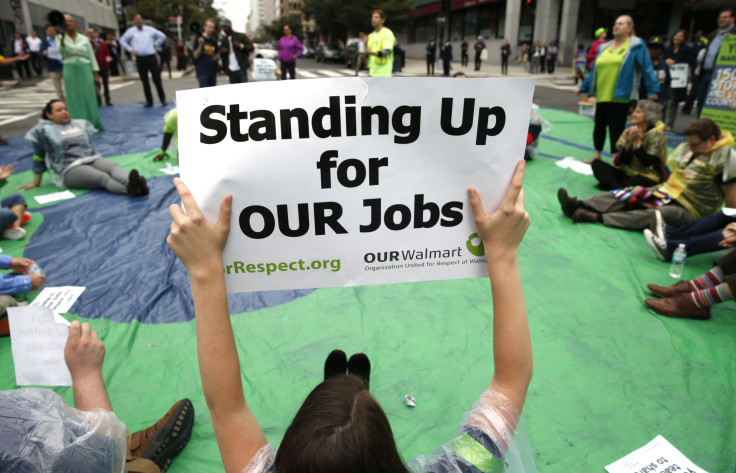Black Friday Showdown: If History Is Any Measure, Protests Against Retail Giant Walmart Won’t Force Change

'Tis the season for ramped-up Walmart activism. Labor rights advocates aiming to improve wages and job stability for the retailer’s lowest-paid employees are promising the biggest strikes ever against Walmart’s Black Friday sales event. But if past efforts are any indication, the strikes aren’t likely to sway the world’s largest retail chain, which accuses activists of being union-backed outside agitators peppered in with a small number of dissatisfied employees.
A day after coordinating its first sit-down strike inside a Walmart store in Los Angeles, the group OUR Walmart on Friday announced plans to strike at 1,600 stores demanding the company implement a $15 hourly minimum wage for all of its 1.3 million U.S. employees and end aggressive optimized scheduling practices that wreak havoc on workers’ personal lives and reliable incomes.
The ongoing dispute underscores growing discontent between low-income hourly U.S. workers and their multibillion-dollar, stock-dividends-paying employers, such as Walmart and McDonald’s. The U.S. economy hasn’t delivered any significant income growth since the end of the Great Recession in 2009, and wages among the lowest-paid workers haven’t kept up with the country’s rising cost of living for decades. Adjusted for inflation, the federal hourly minimum wage (currently $7.25) would have to be $9.66 to match 1974’s $2 hourly minimum wage.
“There have been many times when my family couldn’t afford gas to get me to work,” said Barbara Gertz, a Walmart associate from Colorado and a member of OUR Walmart, a 3-year-old labor rights group backed by the United Food & Commercial Workers International Union. The group hasn’t said if it’s planning more sit-in-style strikes for the week of Black Friday. Walmart says this year it’s planning a “New Black Friday” sales event to take place over five days starting on Thanksgiving.
Walmart spokesman Kory Lundberg said in an email Friday that his company offers “unparalleled advancement opportunities, cash bonuses, a 401k plan and many other benefits” and that workers can use the company’s so-called Open Shifts program “to take charge of their schedules and put together shifts that work best with their busy lives, including access to full-time hours.”
“This same union group has been making similar claims for the last two years and we’ve had very successful Black Friday events each of the last two years and that’s our goal again this year,” Lundberg added.
OUR Walmart points to the company’s revenue and the wealth of its founding family as proof that the company could easily afford to meet the group’s demands.
“Even as Walmart brings in $16 billion in annual profits and Walmart’s owners — the Waltons — build on their $150 billion in wealth, the majority of Walmart workers are paid less than $25,000 a year,” OUR Walmart said in a statement to the press.
OUR Walmart claims it has the support of thousands of company employees, though many do not actively participate in protests. Last year, the group said “tens of thousands of OUR Walmart members” participated in nationwide Black Friday protests. About 110 people were arrested during the strikes, but Walmart also reported 22 million Americans flocked to the company’s stores on Thanksgiving Day last year, pushing past protestors to fill their baskets -- and the company’s coffers.
The reason for the relatively small number of Walmart employees participating in these protests is a point of strong dispute between labor rights groups and Walmart. The company says OUR Walmart doesn’t have enough support from its employees that are happy with their jobs. Critics point out that many low-income retail workers cannot afford to stand up, take time off from work, and risk reprisal, including reduced hours of work, that they need to stay housed and fed.
Walmart, Food Stamps Beneficiary
Walmart’s U.S. same-store sales, a key measure of a retail company’s fiscal health, were up a slight 0.5 percent in its third quarter ending Oct. 31 following seven consecutive quarters of declines.
The company’s key low-income consumer has seen little or no wage growth in recent years, which is adversely impacting traffic to its stores. The company cites “changes in the level of public assistance payments” as a factor that can impact sales performance. The end of extended unemployment benefits earlier this year, which lowered incomes of 48 million Americans, was cited as a reason for Walmart’s sales declines.
Walmart President and CEO Greg Foran said in the earnings release that his company’s sales “were negatively impacted by SNAP-related headwinds.” Walmart is one of the largest single beneficiaries of revenue from SNAP, the federal Supplemental Nutritional Assistance Program, also known as food stamps. Last year, Walmart estimated it attracted 18 percent of SNAP spending.
© Copyright IBTimes 2024. All rights reserved.






















